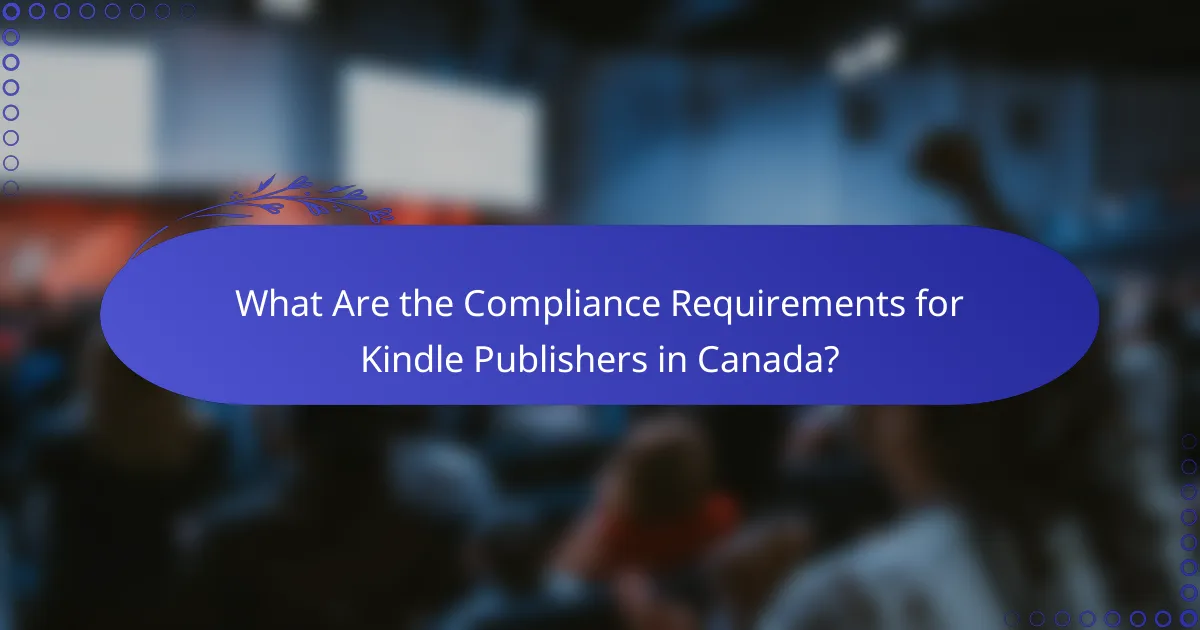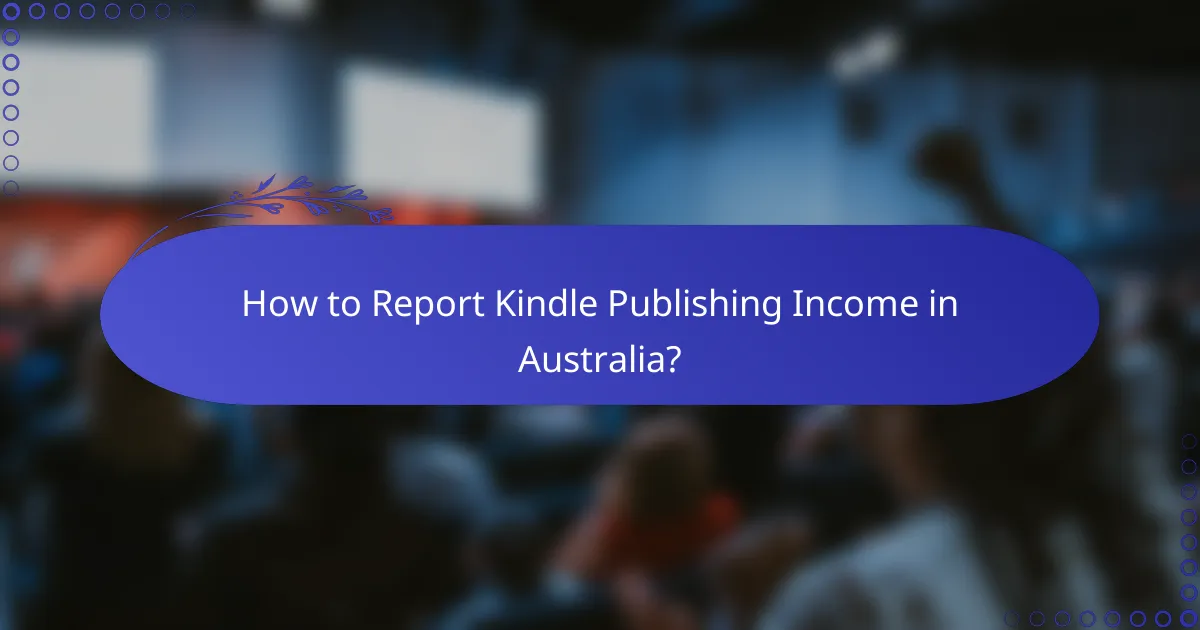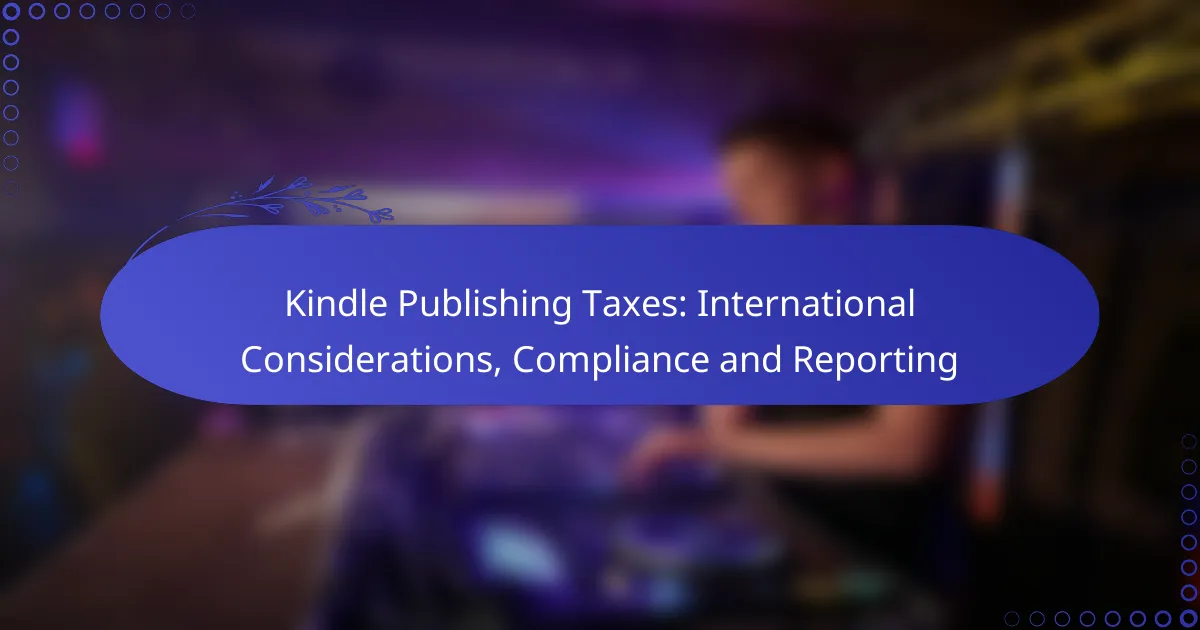When engaging in Kindle publishing internationally, authors must navigate a complex landscape of tax obligations that vary by country. Key considerations include income tax, VAT registration, and compliance with local regulations, which are essential for maintaining legal operations and avoiding penalties. Additionally, understanding the implications of copyright and legal considerations is crucial for foreign authors to effectively manage their revenue and ensure compliance.

What Are the Key Tax Considerations for Kindle Publishing in the UK?
For Kindle publishing in the UK, key tax considerations include income tax obligations, VAT registration requirements, and the implications of double taxation treaties. Understanding these elements is crucial for compliance and effective financial management.
Income tax obligations
As a Kindle publisher in the UK, you are required to pay income tax on your earnings from book sales. This applies whether you are self-publishing or using a publishing service. The income tax rate varies based on your total income, with basic rates starting at around 20% for earnings above a certain threshold.
It’s essential to keep accurate records of your income and expenses related to your publishing activities. This will help you determine your taxable income and ensure you claim any allowable deductions, such as costs for editing, cover design, or marketing.
VAT registration requirements
If your sales exceed the VAT threshold, which is currently around £85,000, you must register for VAT. Once registered, you will need to charge VAT on your book sales and submit regular VAT returns. This applies to both physical and e-books sold to customers in the UK.
For Kindle publishers, it’s important to understand how VAT applies to different types of sales, especially if you sell to customers in other EU countries, as VAT rates can vary significantly. Consider consulting a tax professional to navigate these complexities effectively.
Double taxation treaties
The UK has double taxation treaties with many countries, which can help prevent you from being taxed on the same income in multiple jurisdictions. If you earn income from Kindle sales in countries outside the UK, these treaties may allow you to claim relief from foreign taxes.
To benefit from these treaties, you may need to provide specific documentation to foreign tax authorities. It’s advisable to familiarize yourself with the terms of the relevant treaties and consult with a tax advisor to ensure compliance and optimize your tax situation.

How Do US Taxes Affect International Kindle Publishers?
US taxes can significantly impact international Kindle publishers, particularly regarding compliance and reporting obligations. Understanding these tax implications is essential for foreign authors to avoid penalties and ensure proper revenue management.
IRS reporting requirements
International Kindle publishers must comply with IRS reporting requirements if they earn income from US sources. This typically involves submitting Form W-8BEN to certify their foreign status and claim any applicable tax treaty benefits.
Failure to provide the necessary documentation can result in higher withholding rates on earnings. It’s crucial for authors to keep their information updated and ensure they understand the specific forms required based on their country of residence.
Withholding tax implications
Withholding tax rates for international Kindle publishers can vary significantly depending on their country of residence and any tax treaties in place with the US. Generally, the standard withholding rate is 30%, but this can be reduced or eliminated for authors from countries with favorable treaties.
For example, authors from countries like the UK or Canada may benefit from reduced rates, while those from countries without treaties may face the full withholding rate. Understanding these implications can help authors better estimate their net earnings from Kindle sales.
Filing deadlines for foreign authors
Foreign authors must be aware of specific filing deadlines to remain compliant with US tax regulations. Generally, Form W-8BEN should be submitted before the first payment is made to avoid unnecessary withholding.
Additionally, if a foreign author has US-sourced income, they may need to file a US tax return by June 15, with extensions available until October 15. Staying informed about these deadlines is crucial to avoid penalties and ensure timely reporting.

What Are the Compliance Requirements for Kindle Publishers in Canada?
Kindle publishers in Canada must adhere to specific compliance requirements, including tax obligations and reporting practices. Understanding these requirements is essential for maintaining legal operations and avoiding penalties.
GST/HST obligations
In Canada, Kindle publishers are required to collect Goods and Services Tax (GST) or Harmonized Sales Tax (HST) on sales made to Canadian customers. The applicable rate depends on the province of the buyer, ranging from 5% to 15%.
Publishers must register for a GST/HST account if their taxable sales exceed CAD 30,000 in a single calendar quarter or over four consecutive quarters. Once registered, they must charge the appropriate tax on sales and remit it to the Canada Revenue Agency (CRA).
Tax identification number requirements
To comply with Canadian tax regulations, Kindle publishers must obtain a Business Number (BN) from the CRA. This number is essential for tax reporting and remitting GST/HST.
Publishers can apply for a BN online, by mail, or by phone. It is advisable to keep this number handy for all tax-related transactions and communications with the CRA.
Reporting income from foreign sales
Income from foreign sales must also be reported on Canadian tax returns. Publishers should track all earnings from international sales to ensure accurate reporting.
Foreign income may be subject to different tax treatments, including potential withholding taxes in the country of sale. It is crucial to consult with a tax professional to understand the implications and ensure compliance with both Canadian and foreign tax laws.

How to Report Kindle Publishing Income in Australia?
To report Kindle publishing income in Australia, authors must include their earnings in their annual income tax return. This income is typically classified as business income, and proper documentation is essential for compliance.
Income tax return guidelines
When filing your income tax return, report your Kindle publishing income in the section designated for business income. You will need to keep accurate records of your earnings and any associated expenses. The Australian Taxation Office (ATO) requires you to report your income by the 31st of October each year, unless you have an extension or use a registered tax agent.
Ensure that you have all necessary documentation, such as sales reports from Kindle Direct Publishing, to substantiate your income claims. Failure to report accurately can lead to penalties or audits.
ABN registration for foreign authors
If you are a foreign author earning income from Kindle publishing in Australia, you may need to register for an Australian Business Number (ABN). An ABN is essential for tax purposes and helps streamline your reporting process. You can apply for an ABN online through the Australian Business Register.
Having an ABN also allows you to claim GST credits if your income exceeds the GST registration threshold. However, if your earnings are below this threshold, registration is not mandatory but still advisable for proper tax management.
Deductions available for authors
As a Kindle author, you can claim various deductions to reduce your taxable income. Common deductions include costs related to publishing, such as editing, cover design, and marketing expenses. You can also deduct home office expenses if you use part of your home for your writing activities.
Keep thorough records of all expenses and receipts to substantiate your claims. It’s advisable to consult with a tax professional to ensure you maximize your deductions while remaining compliant with ATO regulations.

What Are the Best Practices for International Tax Compliance?
Best practices for international tax compliance involve understanding local tax laws, maintaining accurate financial records, and consulting with tax professionals. These steps help ensure compliance with regulations and minimize the risk of penalties.
Consulting with tax professionals
Engaging with tax professionals who specialize in international tax law is crucial for compliance. They can provide tailored advice based on your specific situation and the countries where you operate. This can help you navigate complex regulations and optimize your tax strategy.
Consider seeking professionals who are familiar with the tax treaties between your country and the countries where you publish. This knowledge can help you avoid double taxation and take advantage of any available deductions or credits.
Maintaining accurate records
Keeping precise financial records is essential for international tax compliance. This includes tracking income, expenses, and any taxes withheld in different jurisdictions. Accurate records not only support your tax filings but also provide clarity in case of audits.
Implement a systematic approach to record-keeping, such as using accounting software that can handle multiple currencies and tax regulations. Regularly review and update your records to ensure they reflect your current financial situation and comply with local laws.
